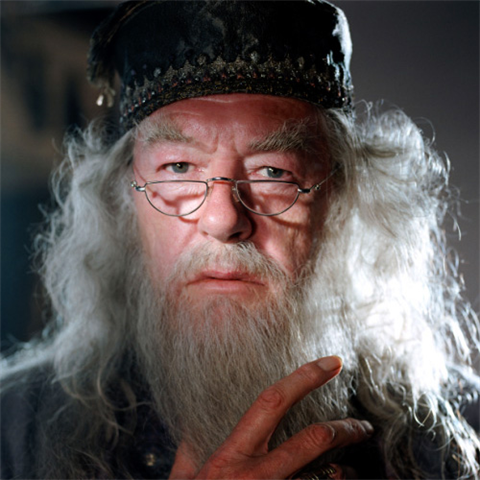
In a classic “hero’s journey” story, there is often a wiser, much older character who serves as our hero’s guiding moral compass for the duration of the journey. Dumbledore, of course, is arguably the most famous example of this role. While earlier novels in the Harry Potter series portray Dumbledore as a fairly one-dimensional mentor, Rowling expands on his complexity as Harry matures throughout the series. We see Dumbledore go from being a cheerful, dependable source of comfort in Harry’s life to a troubled character haunted by his own traumatic past. Unlike many young adult novels, there are clear expressions of frustration and anger from the younger characters who can be confused by Dumbledore’s decisions. There are also many moments of love and admiration between him and his students. Because of this, I don’t think Rowling aims to define whether or not Dumbledore is an example of a good or bad mentor. Rather, her depiction of Dumbledore is reflective of the ways in which children go from idolizing the adults in their lives to growing up and coming to terms with the ways those role models also possess their own flaws.
The first two novels of the series encompass times in Harry’s life that, while riddled with conflict, also carry a lighter tone; it’s clear that Rowling intends these books to be for younger audiences. We see this transitioned as Harry enters his teen years in the Prisoner of Azkaban, where the overall mood appears darker and more complex. Harry’s relationship with Dumbledore follows a similar pattern. In Sorcerer’s Stone and Chamber of Secrets, Dumbledore is described as a light-hearted, whimsical figure. Rowling uses words such as “jolly,” “twinkled,” and “warm” to paint a picture of the kind of mentor he will be for Harry. This tone shifts as Harry grows, and we begin to get a more fuller picture of who Dumbledore is as a person aside from his archetype in the novels.
Particularly in the Order of the Phoenix, Harry and Dumbledore clash significantly as Harry grows frustrated with the lack of support from his mentor and the distance he feels from him. No scene humanizes Dumbledore more than the moments leading up to and including his death in the sixth book, where Rowling describes the harsh realities of both his ailments and his trauma being clearly exposed to Harry for the first time. In the seventh book, following the death of his mentor, Harry grapples with this relationship in many ways. He wonders why Dumbledore had hid so much from him, why he had to press so hard to understand his past, and why he had left the most difficult part of Harry’s journey a complete mystery to him.
These internal battles that Harry faces resemble a parent-child relationship, and I think that Rowling does a great job of mirroring the complexities of this type of relationship to her audience. She shows how naivety and innocence at a younger age leads us to idolize the people who we look up to. Dumbledore, of course, was not one-dimensional and seemingly flawless in the first and second books. But through the perspective of a curious and eager eleven-year-old, he is described as such. Harry’s own growth and maturity is reflected through his opinions of Dumbledore and their dependence on each other.
So, is Dumbledore a good mentor? I’m not sure, but I don’t really think it matters. Harry and Dumbledore’s relationship teaches us as readers to understand how even the people we respect and admire the most in life can be flawed. Ultimately while Harry learns from Dumbledore’s strengths, he also grows to understand and learn from his short-comings as well – and I think that is the message that Rowling aims to teach us the most.
One response to “Dumbledore as a Mentor – An Analysis”
Hi Kriti! I truly enjoyed your blog post, especially after we had the opportunity to discuss this topic during class this Friday. I definitely agree that the way Dumbledore is characterized changes a lot throughout the series, as you said, it follows the still maturing kids we meet in the first book. It was important for you to bring up the point about the frustration in the way this character does not reveal much and is always waiting for the “right” moment to reveal information to Harry, which wears out his relationship with him. When it comes to introducing new ideas, you did a really great job. I specially liked how you talked about this mentor figure being reflective of the idolization of adults and how with time kids meet the reality of things, that everyone has their imperfections. From a psychological perspective, this is fascinating, and I had not thought about that before. If you ever expand more on this theme, I think it would be interesting to examine Dumbledore’s relationship with other mentees, rather that be Ron, Hermione or even Hogwarts’ staff. Keep up the awesome work 🙂